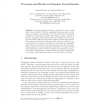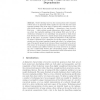21 search results - page 3 / 5 » Akaike causality in state space |
CDC
2009
IEEE
13 years 10 months ago
2009
IEEE
Abstract— Q-learning is a technique used to compute an optimal policy for a controlled Markov chain based on observations of the system controlled using a non-optimal policy. It ...
GEOS
2005
Springer
13 years 11 months ago
2005
Springer
Traditional spatial information systems hold only a single state of the ‘real world’. However, geographic phenomena have not only static but dynamic characteristics. The work d...
CSFW
1999
IEEE
13 years 10 months ago
1999
IEEE
We propose an efficient automatic checking algorithm, Athena, for analyzing security protocols. Athena incorporates a logic that can express security properties including authenti...
CONCUR
2000
Springer
13 years 10 months ago
2000
Springer
Model checking based on the causal partial order semantics of Petri nets is an approach widely applied to cope with the state space explosion problem. One of the ways to exploit su...
JAIR
2006
13 years 6 months ago
2006
Fast Downward is a classical planning system based on heuristic search. It can deal with general deterministic planning problems encoded in the propositional fragment of PDDL2.2, ...


